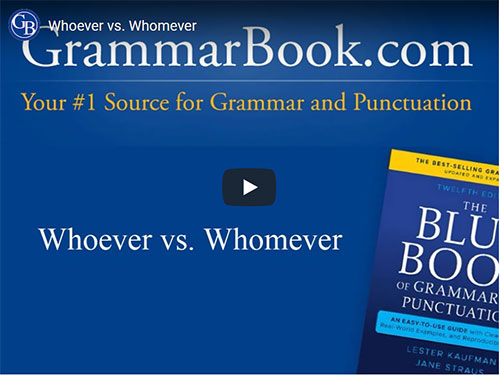|
Having trouble viewing this message? Click here to view it online.
To unsubscribe or change contact details, scroll to the bottom and follow the link.
|



|
|
What Is a Sentence Modifier?
|
|
A modifier is a word, phrase, or clause used to provide additional information in a sentence. The information is not vital to the sentence's meaning, but it often gives details that offer readers extra clarity.
Examples
I love when Samantha wears that jacket.
Josef waited patiently for two hours.
Kathy plans to work as a dental hygienist. |
Those statements are clear enough. Now let's further modify them.
I love when Samantha wears that green jacket. (modifying word)
Josef waited patiently in line for two hours. (modifying phrase)
After she graduates, Kathy plans to work as a dental hygienist. (modifying clause) |
In each case, we included information that does not impact our central understanding of each statement but does supply us with greater insight into it. Without the modifiers, the meaning is intact but the image is less vivid.
The distinction we'll discuss concerns what we see in the last example about Kathy: a dependent clause enhancing an independent clause as an adverbial modifier.
The idea expressed in the dependent clause modifies the entire thought in the main clause. This makes the dependent clause a sentence modifier, which is also sometimes referred to grammatically as an absolute.
Sentence Modifiers: A Class of Their Own
The distinctions of a sentence modifier can be subtle. Consider the following sentences:
I have the picnic basket that Yolanda wanted to bring to the lake.
Benjamin is the zookeeper who is in charge of the primates.
Jack holds the talisman, which will rescue Plutopia from the forces of Manchow. |
In each statement, we have a dependent relative clause serving as adjectival modifier of a noun (basket, zookeeper, talisman). Because they modify a specific word, they are not sentence modifiers.
Now let's look at a few more sentences:
Renaldo put the passcode in the safe, which should help us feel more secure about it.
Unless Ruth can bring the sugar, we will not be able to bake the cake today.
The Blue Buzzards just gave him a four-year, $250 million contract, which makes the rest of the team less excited about their own paychecks. |
Each of these statements includes a dependent clause, but when we look at each one closely, we can see that it modifies the entire thought in the main clause as opposed to one element of it.
For example, in the first sentence, the dependent clause which should help us feel more secure about it modifies neither the noun that it follows (safe) nor the noun preceding that one (passcode). Rather, it elaborates on the complete thought Renaldo put the passcode in the safe.
In the second sentence, the dependent clause unless Ruth can bring the sugar is technically an adverbial modifier of the verb phrase will not be able. However, its information applies to the entire main clause. We will not be able to bake the cake today unless Ruth brings the sugar—no sugar, no cake.
The modifying clause in the third statement—which makes the rest of the team less excited about their own paychecks—may appear to some to be a nonrestrictive clause modifying the noun contract, but it pertains to the entire preceding statement. The team is less excited because of what the Blue Buzzards did for the one player.
Sentence Modifiers: Recognizing What They Are Not
Now that you understand what a sentence modifier is, you can be more aware of what it is not. Let's look at some sentence pairs.
I found the red hammer, which I can use to finish the project in the garage.
I found the red hammer, which means I can finish the project in the garage.
Studying regularly, Nina will graduate with excellent grades.
Because she studies regularly, Nina will graduate with excellent grades. |
In the first sentence of each pair, the modifier further describes a noun—hammer and Nina. In the second sentence of each pair, the dependent clause applies to the full main clause.
Related Topics
Which vs. That
Nonrestrictive Clause: What Is a Nonrestrictive Clause?
Becoming Savvy with Sentence Structures: Part Two
|
View and comment on this
article on our website.
|
|
|

|
Pop Quiz
Identify the sentence modifiers in the following sentences. If a sentence does not have a sentence modifier, leave it be.
1. Wendy is still inquiring about the flight schedule because of the delay.
2. Once you master music theory, you will understand the piano even more.
3. Thomas just bought a new car, which he'll surely drive with the windows down and the radio up.
4. The diplomats finally agreed, which allows construction of the international dog park to proceed.
5. We can talk about your allowance after you finish your chores.
|
 |
The Blue Book of Grammar and Punctuation
by Lester Kaufman and Jane Straus |
The Authority on English Grammar! Twelfth Edition Now Available
An indispensable tool for busy professionals, teachers, students, homeschool families, editors, writers, and proofreaders.
Available in print AND as an e-Book! Over 2,000 copies are purchased every month!
To order the book, simply click the link to order the book from the GrammarBook.com website.
|
Get Even More Useful Grammar Tips
In addition to our weekly newsletter, we post new entries about American English grammar. The following is our most recent article. Bookmark our GrammarBook blog and be sure to check it often.
What Is the Plural of Money?
|
Free BONUS Quiz for You!
Friend, because you are a subscriber to the newsletter, you get access to one of the Subscribers-Only Quizzes. Click here to take an A vs. An Quiz and get your scores and explanations instantly!
We will be adding many more quizzes this year to our already substantial list of them. If you have suggestions for topics we have not yet covered, please send us a message at help@grammarbook.com.
|
Hundreds of Additional Quizzes
at Your Fingertips
Subscribe now to receive hundreds of additional English usage quizzes not found anywhere else!
Teachers and Employers
Save hours of valuable time! You may assign quizzes to your students and employees and have their scores tallied, organized, and reported to you! Let GrammarBook.com take the hassle out of teaching English!
"Fun to test my skills."
"The explanations really help ... thanks!"
"I can select the quizzes to assign to my students, and then the results are reported to me automatically!"
If you think you have found an error in a quiz, please email us at help@grammarbook.com
|
Wordplay

Pop Quiz Answers
1. Wendy is still inquiring about the flight schedule because of the delay. no sentence modifier
2. Once you master music theory, you will understand the piano even more.
3. Thomas just bought a new car, which he'll surely drive with the windows down and the radio up. no sentence modifier
4. The diplomats finally agreed, which allows construction of the international dog park to proceed.
5. We can talk about your allowance after you finish your chores.
|
 |
English In A Snap:
68 One-Minute English Usage Videos FREE |
Learn all about who and whom, affect and effect, subjects and verbs, adjectives and adverbs, commas, semicolons, quotation marks, and much more by just sitting back and enjoying these easy-to-follow lessons. Share them with your colleagues (and boss), children, teachers, and friends as well! Click here to watch.
|
|